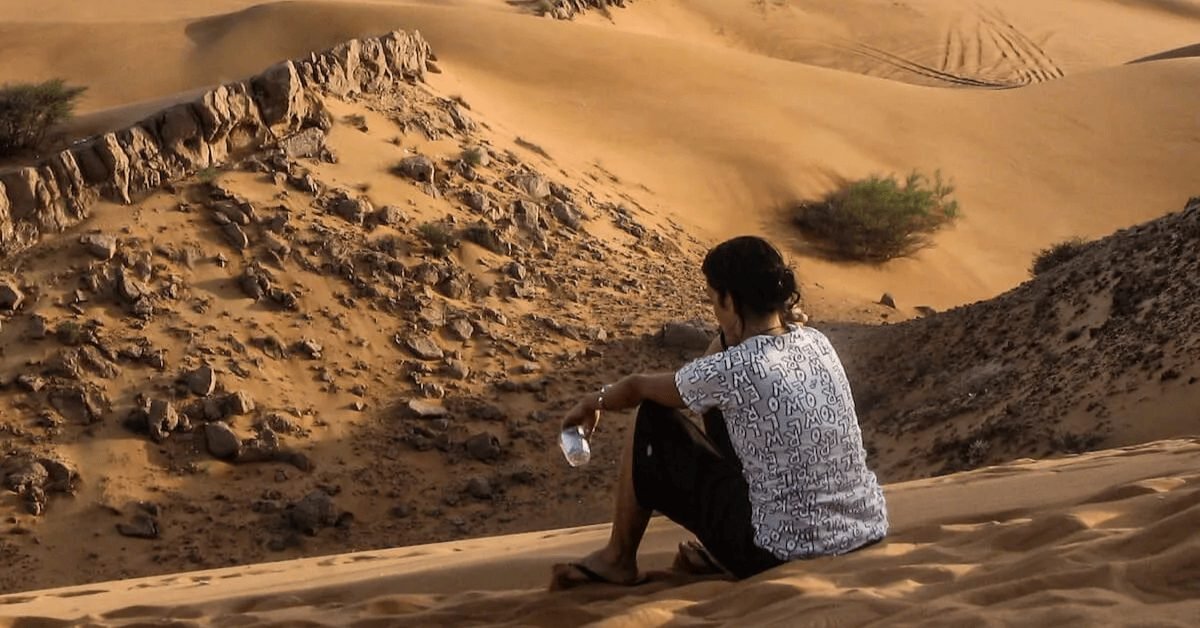Dubai is renowned for its exhilarating desert safaris, offering tourists a thrilling experience in the golden sands. However, just like any other travel adventure, there is always a chance of falling ill unexpectedly. In this article, we will explore the precautions you can take before embarking on a desert safari and what to do if you find yourself feeling unwell during this exciting journey.
Embarking on a Dubai desert safari is an unforgettable experience for many travelers. The vast expanse of the Arabian Desert, with its towering dunes and mesmerizing landscapes, sets the stage for an adventure filled with adrenaline-pumping activities, cultural encounters, and breathtaking sunsets. However, amid the excitement and wonder, it’s important to be prepared for the possibility of falling ill during your desert safari. Understanding the potential health risks and taking necessary precautions can help ensure a safe and enjoyable experience.
What is Dubai Desert Safari?

Before we delve into the topic of falling sick during a desert safari, let’s understand what a desert safari entails. A desert safari is an immersive journey that takes you deep into the heart of the Arabian Desert, allowing you to explore the raw beauty of the dunes and experience the rich Emirati culture. It offers a range of activities that cater to different preferences, from adrenaline junkies seeking thrilling dune-bashing rides to those looking for a serene sunset experience amidst the tranquil desert surroundings.
Types of Desert Safaris
There are various types of desert safaris available in Dubai, each offering a unique experience. Morning safaris are ideal for early risers who want to witness the desert come alive with the first rays of the sun. Evening safaris offer a magical setting as the sun sets and paint the sky in vibrant hues, followed by a traditional Arabian feast and captivating entertainment. Overnight safaris provide an opportunity to spend a night under the starry desert sky, complete with traditional Bedouin-style campsites. Private safaris cater to those who prefer a more personalized experience, allowing them to tailor the itinerary according to their preferences.
Popular Desert Safari Locations
Dubai boasts several locations for desert safaris, each offering its unique charm. The Dubai Desert Conservation Reserve is a protected area where visitors can experience the desert ecosystem in its pristine form while engaging in activities such as wildlife spotting and guided nature walks. The Lahbab Desert, also known as the Red Dunes, is famous for its picturesque landscape of towering red dunes, providing an ideal backdrop for activities like dune bashing and sandboarding. The Al Marmoom Desert, with its expansive desert plains and serene atmosphere, offers a more tranquil and secluded experience for those seeking solace in the desert.
The Unforeseen: Getting Sick During a Desert Safari
While a desert safari is a remarkable experience, it’s crucial to be aware of the potential health risks that can arise. The harsh desert environment, characterized by extreme temperatures, arid climate, and exposure to sand and dust, can pose challenges to the human body. Understanding the common health concerns associated with desert safaris can help you recognize the symptoms and take appropriate action if you find yourself feeling unwell during your adventure.
Common Health Concerns
During a desert safari, certain health concerns may arise due to the unique environmental conditions. These can include heat exhaustion, dehydration, allergies, insect bites, and sunburn. It’s important to familiarize yourself with these potential risks and take preventive measures to minimize their impact on your well-being.
Heat Exhaustion and Dehydration
Dubai’s desert climate can be unforgiving, particularly during the summer months when temperatures soar. Heat exhaustion and dehydration are common risks, especially when engaging in outdoor activities. To prevent heat-related illnesses, it’s crucial to stay hydrated by drinking plenty of water throughout the safari. Wearing loose, lightweight clothing that allows your skin to breathe and using sunscreen to protect yourself from the scorching sun are also essential. It’s advisable to take regular breaks in shaded areas and avoid prolonged exposure to direct sunlight.
Allergic Reactions and Insect Bites
For some individuals, exposure to certain plants, pollens, or insects found in the desert environment can trigger allergies or allergic reactions. Additionally, insect bites from mosquitoes or other bugs can lead to discomfort and, in some cases, allergic responses. To minimize the risk of allergic reactions, consider carrying antihistamines or any prescribed medications if you have known allergies. Wearing long-sleeved clothing and applying insect repellent can also protect against insect bites.
Precautions to Take Before a Desert Safari
To ensure a safe and enjoyable desert safari experience, it’s essential to take certain precautions before embarking on your adventure. By being proactive and prepared, you can minimize the chances of falling ill and maximize your enjoyment of the safari.
Consult Your Doctor
If you have any pre-existing medical conditions or concerns, it’s advisable to consult your doctor before participating in a desert safari. They can provide specific advice based on your health and recommend necessary precautions or medications to ensure your well-being throughout the journey. Your doctor may also advise you on any specific activities or conditions to avoid to prevent complications.
Carry Medications and First Aid Kit
When venturing into the desert, it’s always wise to carry a small first aid kit containing essential items. Include bandages, antiseptic ointments, and over-the-counter medications for common ailments like headaches, allergies, and stomach upsets. This kit can come in handy in case of minor injuries or illnesses during the safari. Additionally, if you have any prescribed medications, ensure you carry an ample supply to last the duration of your trip.
Stay Hydrated
One of the most critical aspects of preparing for a desert safari is ensuring proper hydration. The desert environment can quickly deplete your body’s water reserves, leading to dehydration. Drink plenty of water in the days leading up to your safari and continue to stay hydrated throughout the journey. It’s recommended to carry a refillable water bottle with you to have easy access to water at all times.
What to Do If You Get Sick
Despite taking precautions, there is still a possibility of falling ill during a desert safari. If you find yourself feeling unwell, it’s important to know the appropriate steps to take to ensure your safety and well-being.
Inform Your Guide
If you start experiencing symptoms of illness during the safari, such as dizziness, nausea, or fatigue, it’s crucial to notify your safari guide or any tour staff immediately. They are trained to handle such situations and can provide the necessary assistance and support. Communicating your condition promptly allows them to take appropriate action and ensure your comfort and safety.
Seek Medical Assistance
If your symptoms worsen or you experience severe discomfort, it’s essential to seek medical assistance promptly. Desert safari operators usually have access to medical support or can guide you to the nearest medical facility. Delaying medical attention can exacerbate your condition and potentially put your health at risk. Therefore, don’t hesitate to reach out for professional help when needed.
Follow Medical Advice
Once you have received medical attention, it’s important to follow the advice and instructions provided by the healthcare professionals. They are trained to assess your condition and provide appropriate medical advice and treatment. Adhering to their recommendations will help facilitate your recovery and ensure the best possible outcome. This may include taking prescribed medications, following a specific diet or rest regimen, or avoiding certain activities that could worsen your condition. It’s crucial to prioritize your well-being and trust the expertise of the medical professionals assisting you.
Safety Measures During a Desert Safari
To prevent health issues and ensure a safe and enjoyable experience during your desert safari, it’s important to observe certain safety measures throughout your journey.
Stay Within Group
When participating in a desert safari, it’s essential to stay with your assigned group or follow the instructions of your safari guide. Venturing off on your own can be risky, as the desert terrain can be vast and disorienting. By staying together as a group, you can benefit from the collective knowledge and experience of the guide and ensure everyone’s safety.
Protect Yourself from the Sun
The desert sun can be intense, and prolonged exposure to its rays can result in sunburn, heatstroke, and other related ailments. Protect yourself by wearing appropriate clothing that covers your skin, such as lightweight long-sleeved shirts and pants. Don’t forget to wear a wide-brimmed hat to shield your face and neck from direct sunlight. Apply broad-spectrum sunscreen with a high SPF to any exposed areas of skin, including your face, arms, and legs. Reapply sunscreen regularly, especially after activities that involve water or excessive sweating.
Avoid Close Contact with Animals
During a desert safari, you may come across animals such as camels or falcons, which are often part of the cultural experiences offered. While these interactions can be exciting, it’s important to maintain a safe distance and follow the instructions of the guides. Respect the animals’ space and refrain from any behavior that may provoke or endanger them. By adhering to safety measures and treating the animals with care, you can ensure a harmonious and enjoyable experience for both yourself and the animals.
Conclusion
A Dubai desert safari is an adventure filled with excitement, wonder, and cultural exploration. While the focus is on creating lasting memories and immersing yourself in the beauty of the Arabian Desert, it’s essential to be prepared for any unforeseen circumstances, such as falling ill during the journey. By taking precautions before your safari, staying aware of common health concerns, and knowing the appropriate steps to take if you do get sick, you can maximize your safety and enjoyment throughout the experience. Remember to consult your doctor, carry necessary medications, stay hydrated, and promptly inform your guide if you experience any health issues. With proper preparation and vigilance, you can fully embrace the magic of a desert safari while ensuring your well-being.

